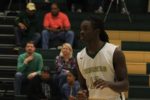As she races down the sideline with the soccer ball at her feet, junior Kenzie Kremer can hear her teammates cheering her on and parents screaming her name. As she heads for the end line to cross the ball in front of the goal, she is tripped from behind by an opposing player. The parents from both teams erupt in anger, yelling at the referee.
Crowd commentary from the sidelines is always an inherent part of sports, but some people worry that these comments can be taken too far when high school students are involved.
“When parents from the other teams yell at a bunch of 16 and 17 year olds, it is really unprofessional,” Kremer said.
Senior Riley Koch has played lacrosse at Northwood for four years.
“At our [game against Orange], some dude was cussing at me from the stands because I hit someone in the throat and they didn’t call it,” Koch said.
Similar to some other athletes in the school, Koch dislikes the occasional remarks from parents in the stands.
“I think parents should never say anything during a game; it’s not their job,” Koch said. “There’s a coach for a reason.”
Kremer’s mother, Kristi, tries to keep her comments to an appropriate minimum during Kenzie’s time on the field.
“I’ll yell ‘go’ or ‘run’ when it’s clearly time to do so,” Kristi said. “I yell, ‘Use your space’ and the occasional ‘Shoot it’ if within range. I’m no coach, but I’ve sat on the sidelines for 10 years, and feel I can at least get away with that.”
JV softball coach Jacqueline Sculli dislikes hearing comments from parents during games.
“Everyone is a coach on the opposite side of the fence,” Sculli said. “It’s always easier on the opposite side of the fence when you’re not in play.”
Softball is one of several sports at Northwood that has a policy enacted by means of their handbook that allows comments to be made by parents to the coach only after the game has ended.
“Our policy for softball is that if you have a question about something that we did during a game, wait 24 hours before you contact us,” Sculli said. “Calm down and get yourself together, because things are always said in the heat of the moment.”
The policy was put in place nine years ago and has since made a positive change in the atmosphere at softball games.
“We have a good group of parents at softball,” Sculli said.
Girls’ soccer coach David Holub is thankful for parents in the stands in certain situations.
“I like parents in the stands when they’re there to support the team and to cheer for the players,” Holub said. “I don’t like parents in the stands when they don’t appreciate the rules of the game or understand them as well as I think they should.”
Senior basketball player Abe Omar likes to hear the crowd get rowdy during heightened moments in a game.
“Sometimes I like when parents yell and get really into the game, but only when the game is intense,” Omar said. “Otherwise, it distracts me and puts a lot of pressure on me.”
Bryce Davis, a senior baseball player, appreciates his parents’ constructive criticism when he is at the plate.
“I don’t mind it, as long as it isn’t distracting my teammates,” Davis said. “If my dad has something to say to me, I don’t mind turning my head and glancing at him for him to motion what I am doing wrong.”
Senior softball player Anna Goldman has been on the varsity team since her freshman season.
Her mother, Robin, says that she only decides to be vocal during Anna’s games when she has good intentions.
“Unless I have something positive or encouraging to say—unless I thought someone was going to get hurt—I don’t say it,” Robin said. “I would not want to be a distraction to Anna or a liability to a potential outcome.”
Greg Hubbard is a parent of junior Juliana Hubbard, who plays on the girls’ soccer team.
“I, as a parent, have to understand that the coach is providing direction,” Greg said. “Encouragement is what I believe the parents need to provide and not direction.”
Essentially, most parents are vocal in hopes of motivating their child as they play their sport.
“I’ve seen kids certainly get that extra burst of speed when everyone is yelling for them on a break and they can feel the energy,” Kristi Kremer said. “The kids can feel it when the crowd has their back.”
– By Rachel Stoner



